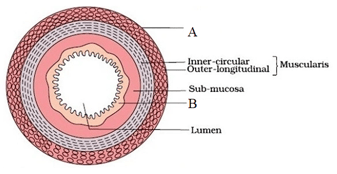Human Digestive System and Associated Digestive Glands
Human Digestive System and Associated Digestive Glands: Overview
In this topic, we will learn about the digestive system which consists of the alimentary canal and the associated glands. It also helps us understand the terms thecodont, diphyodont, villi and the cardiac portion.
Important Questions on Human Digestive System and Associated Digestive Glands
If for some reason our goblet cells are non functional, this will adversely affect:
Which one of the following is the correct matching of the site of action on the given substrate, the enzyme acting upon it and the end product ?
What will happen if the secretion of parietal cells of gastric glands is blocked with as inhibitor?
In man, the zymogen or chief cells are mainly found in:
Most of the fat digestion occurs in:
The oesophagus is a thin, long tube which extends _____ passing through the neck.
Mark the incorrect match:
F cells of the Pancreas secrete
Pancreatic Polypeptide cells form the exocrine part of the Pancreas.
Chief cells secrete the Pancreatic Polypeptide hormone.
Chief cells secrete hydrochloric acid in the stomach.
Chief cells are found in the _____ glands of stomach.
Which cells of the stomach secrete pepsinogen?
Label parts A and B in the given image of the transverse section of the intestine.

Serosa is the layer of alimentary canal that contains the smooth muscles.
Muscularis is a thin layer of smooth muscles in the alimentary canal that is arranged into an outer longitudinal layer and an inner circular layer.
Choose among the given options and write the correct answer.
In which layer of the intestinal wall, the Brunner's glands are present?(Mucosa/Submucosa/Muscularis mucosa)
Draw the transverse section of the alimentary canal and label the different layers.
The duct of the sublingual gland is called Wharton's duct.
Name the almond-shaped salivary gland located on the floor of the oral cavity.
